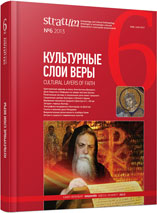«Здесь я понимаю, что такое избранничество»: парадоксы внерелигиозной религиозности Альбера Камю
“Here I understand what it means to be the chosen one”: Paradoxes of Albert Camus’s Out-Religious Religiosity
Author(s): Oksana A. DovgopolovaSubject(s): Philosophy, History of Philosophy, Contemporary Philosophy, Existentialism
Published by: Издательский дом Stratum, Университет «Высшая антропологическая школа»
Keywords: Albert Camus; freedom; religiosity; existentialism; absurdity
Summary/Abstract: The author studies the idea of interrelations between human and the transcendent in Albert Camus’ s works. It appears that Camus distinguishes two ways of relations with the transcendent. In the first one, human acknowledges predetermination of the world history in general and impossibility to change one’s fate. This is position of a slave. In the second case, humans rebel against the God, put themselves in His place and attempt to take the Lord’s place in the dyad «Slave-Lord». These are versions of a nihilistic riot, destructive for humans and mankind. Camus was sure that it would be a mistake to look for something transcendental outside this world. A variety of transcendence through plunging in the essence of this world forms Camus’ s special out-religious religiosity. The two ways of relations with Transcendent are determined by Camus. The first is acknowledgment of predetermination of the Human History and impossibility of alteration of the human’s life. In other case Man rebels against God, inserting himself at the place of the Lord in dyad “Lord-Slave”. Camus was sure that the search of Transcendent out of this world is erroneous. The variety of transcending through the plunging in the essence of this world creates the specific Camus’ out-religious religiosity.
Journal: Stratum plus. Археология и культурная антропология
- Issue Year: 2013
- Issue No: 6
- Page Range: 277-284
- Page Count: 8
- Language: Russian
- Content File-PDF

